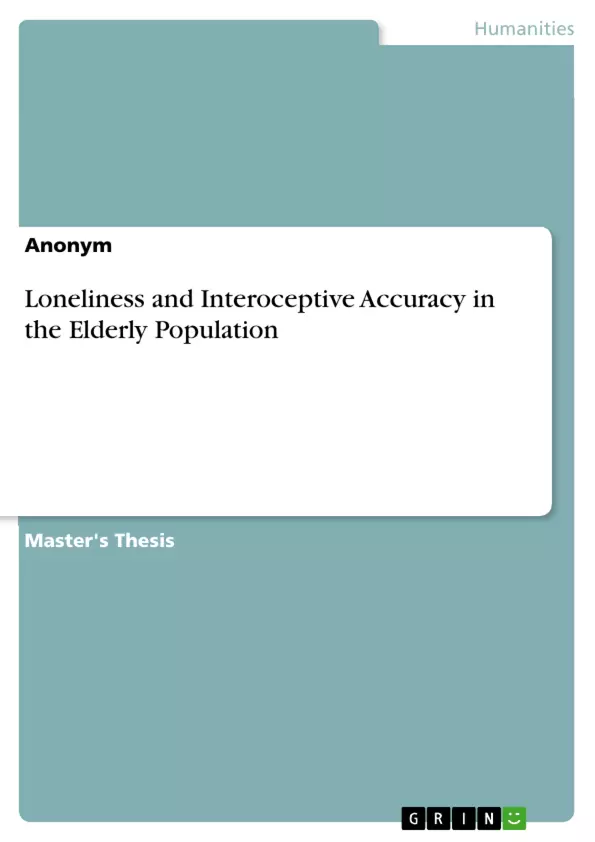The present study aims to investigate the relationship between interoceptive accuracy and loneliness in the elderly population. Because of the negative consequences of atypical (too low or too high) interoceptive accuracy and the negative consequences of loneliness, an investigation of how these two constructs are linked to and might interact with each other is of major relevance. By combining two large areas, the one of loneliness and the one of interoception, which are both of great psychological interest, we intent to close a gap within the current research literature. Results might give us new insights into the perception (interoeptive and exteroceptive) of lonely persons.
Loneliness is described as an unpleasant feeling of deficits in quantity or quality of social ties. Prior studies observed that lonely individuals displayed higher levels of alexithymia (emotional blindness). Furthermore, research in the field of interoception (the perception of the bodily state) discovered atypically low interoceptive abilities within highly alexithyimic individuals. Based on previous findings, we expected lonely individuals to show decreased levels of accurate interoceptive abilities together with reduced neural activity within the anterior insula, the somatosensory cortex (postcentral gyrus), the inferior frontal gyrus and the precentral gyrus. Brain areas previously associated with accurate interoceptive abilities. The data for the present fMRI study were collected within a sample of 28 participants older than 64 years. The extent to which a participant is capable of perceiving his/ her own bodily sensations (interoceptive accuracy) was measured via a heartbeat tracking task, during which the subject was required to perceive his/ her own heart rate and report the counted number of heartbeats. Additionally, several questionnaires, assessing loneliness, trait anxiety, depression and alexithymia, were administered and analysed.
Inhaltsverzeichnis (Table of Contents)
- Introduction and Theoretical Background
- Loneliness in the Elderly Population
- Loneliness and Alexithymia
- Interoceptive Accuracy
- Interoceptive Accuracy and Alexithymia
- Limitations of Prior Research
- Aim of the study and hypothesis
- Methods
- Participants
- Measures
- Sociodemographic Information
- Loneliness
- Anxiety
- Depression
- Alexithymia
- Interoceptive Accuracy
- fMRI Data Acquisition
- Study procedure
- Data Analysis
- Behavioral and Statistical analysis
- fMRI analysis
- Results
- Behavioral results
- Descriptive Statistics
- Correlational Analysis
- Analysis of Variance
- Analysis of Frequency
- fMRI results
- Main effect of condition
- Interaction loneliness x condition
- Discussion
- References
- Appendix
- List of Figures
- List of Tables
- Abstract
- German Abstract
Zielsetzung und Themenschwerpunkte (Objectives and Key Themes)
This master's thesis explores the relationship between loneliness and interoceptive accuracy in the elderly population. The study aims to investigate the potential behavioral and neurophysiological evidence linking these two concepts. Specifically, the study explores how loneliness, a prevalent issue among older adults, might influence individuals' ability to perceive and interpret internal bodily sensations.
- Loneliness as a prevalent issue in the elderly population
- The concept of interoceptive accuracy and its potential role in emotional regulation
- Investigating the potential correlation between loneliness and interoceptive accuracy
- Exploring the neurophysiological mechanisms underlying this relationship using fMRI data
- Implications of the findings for understanding and addressing loneliness in the elderly
Zusammenfassung der Kapitel (Chapter Summaries)
The first chapter introduces the theoretical framework of the study, focusing on loneliness in the elderly population. It delves into the definition and prevalence of loneliness, discussing its potential causes and negative consequences. The chapter also explores the concept of alexithymia and its relationship to loneliness, highlighting how difficulties identifying and expressing emotions might contribute to feelings of social isolation. The second chapter presents the methodological approach of the study, outlining the recruitment process for participants and detailing the various measures used to assess loneliness, alexithymia, interoceptive accuracy, and other relevant factors. This chapter also describes the fMRI data acquisition and analysis techniques employed in the study. The third chapter presents the results of the study, examining both behavioral and neurophysiological data. It includes analyses of descriptive statistics, correlational relationships, and comparisons across different groups. The chapter concludes by highlighting the key findings regarding the relationship between loneliness and interoceptive accuracy.
Schlüsselwörter (Keywords)
The key concepts and themes of this master's thesis include loneliness, interoceptive accuracy, the elderly population, alexithymia, neurophysiology, fMRI, behavioral analysis, and social isolation. These terms represent the core focus of the study, which investigates the potential link between loneliness and individuals' ability to perceive internal bodily sensations, exploring both behavioral and neurophysiological evidence.
Frequently Asked Questions
What is interoceptive accuracy?
Interoceptive accuracy refers to an individual's ability to accurately perceive internal bodily sensations, such as their own heartbeat or breathing.
How is loneliness linked to alexithymia?
Prior studies have observed that lonely individuals often display higher levels of alexithymia, which is characterized by a difficulty in identifying and expressing emotions.
What was the goal of the fMRI study in this thesis?
The study aimed to investigate the neurophysiological mechanisms linking loneliness and interoception, specifically looking for reduced activity in brain areas like the anterior insula and somatosensory cortex.
How was interoceptive accuracy measured?
Accuracy was measured via a heartbeat tracking task, where participants had to count their own heartbeats without feeling their pulse and report the number.
Why is this research relevant for the elderly?
Loneliness is a significant issue in the elderly population. Understanding how it affects physical self-perception can lead to better psychological interventions and social support strategies.
- Arbeit zitieren
- Anonym (Autor:in), 2018, Loneliness and Interoceptive Accuracy in the Elderly Population, München, GRIN Verlag, https://www.grin.com/document/1106347



